- Home
- Lisa Gardner
Fear Nothing: A Detective Page 8
Fear Nothing: A Detective Read online
Page 8
“He’s not a prepper,” D.D. stated.
“No,” Alex agreed. “This is about domination, control. Not someone looking to practice fieldwork.”
“And he’s not practicing,” Neil said dryly. “The use of chloroform, the unique manner of asphyxiation, the methodical removal of skin . . . This guy knows exactly what he’s doing. Our killer’s not learning as he goes. Our killer’s already a pro.”
• • •
THE FRONT DOORBELL RANG. The sound, so ordinary and mundane, happening at the scene of a murder made them all jump. They shared chagrined expressions.
“Russ Ilg, my physical therapist,” D.D. guessed.
Alex went to let him in.
“Sure you want to do this?” Phil asked, the second Alex was out of earshot.
“Yes. Why wouldn’t I?”
Phil and Neil exchanged a look. D.D. interpreted it correctly and shot them an annoyed one of her own.
“You don’t have to cover for me,” she bit out. “We go through this . . . reenactment, and the most logical conclusion is that I’m an out-of-control fruitcake who discharged her weapon for no good reason, well then, that’s what you should report back to FDIT. I’m not looking for handouts. I want the truth.”
“We’re behind you,” Neil murmured. “Whatever happens. Squad is family; you know that.”
“Please, I’ve met your family.”
That made them smile. Neil’s family was a bunch of Irish drunks. He often joked he wasn’t the black sheep of his family for being gay. He was the black sheep for being the only one still sober.
Alex returned with a younger-looking guy, six feet, gym fit and clad in black sweats. D.D. did the honors. “Detectives Phil and Neil, Boston PD. Russ Ilg, my personal torturer, er, physical therapist.”
Everyone exchanged handshakes. D.D. kept her own arms tight by her sides, where no one would see her hands tremble with growing nerves. Her first choice for this mission would’ve been her doctor. But MDs didn’t keep schedules that allowed for last-minute field trips; hence, Russ agreed to do the honors. Besides, as he put it, doctors just diagnosed the damage. His job was to rebuild and repair, which provided him with a much more intimate knowledge of injuries both past and present.
As the lead detective, Phil brought them from the kitchen to the base of the stairs. D.D. could see the bullet holes in the drywall along the right-hand side. Three individual marks, sprayed across the surface. If she’d been aiming at the time, it didn’t speak well of her marksmanship.
Phil cleared his throat. “So D.D., um, Sergeant Detective Warren was found unconscious at the base of the stairs. Given the, um, injuries she sustained, working theory is that she started at the top, fell down.”
Russ nodded. He didn’t look at D.D. but kept his gaze focused on the straight rise of the narrow staircase, for which D.D. was grateful. Suddenly, she didn’t feel so great. Her stomach was churning, and she could feel sweat once more beading her brow.
Rockabye, baby . . .
She squeezed her eyes shut, as if that would make the feeling of foreboding go away. Her own nervousness angered her. She was here to remember. She needed to remember.
She forced her eyes open and locked them on the bullet holes instead. Her damage inflicted by her bullets fired by her gun. She owned them. One way or another, they would always be hers.
“So,” Russ started, as if reading her thoughts, “first thing I’m noticing is that there’s no right-hand railing on this staircase. Violates code, I believe, but not so uncommon in renovated older homes with narrow staircases.”
They all nodded.
“Given that variable alone, D.D. was definitely falling backward down the stairs, facing the second-floor hall at the time.”
He gestured to the stairs and they obediently filed into a single line, climbing up behind him.
“What’s the first thing you do as you fall?” Russ asked now. It seemed a rhetorical question, so no one answered. “You reach out a hand to catch yourself. In this case, D.D.’s holding her firearm in her right hand, correct?”
She nodded.
“Given that you fired off three shots, you were still holding the gun in your right hand as you fell. That leaves your left hand to catch yourself, which would explain the damage to your shoulder.” Russ had arrived at the top of the stairs. He indicated for them to take up a position in the hall. At which point, he backed down several steps, then grabbed the top of the left-hand railing with his left hand and abruptly let himself twist and dangle.
D.D. could see it immediately. The way his dangling posture rotated and strained the muscles of his neck, shoulder and left arm. She couldn’t help herself; she winced, looked away, her arm held even more tightly to her side.
“D.D. falls backward,” Russ stated matter-of-factly. “She reaches out with her left arm to break the force of her backward momentum. In turn, her arm is abruptly wrenched in abduction and external rotation as she grabs on to the railing. This leads to the avulsion fracture of the lesser tuberosity of her left humerus, where the tendons that connect the muscle to the bone end up tearing away a piece of that bone. Then, sequentially speaking, her head snapped away from her left shoulder due to the sudden halt in momentum, leading to the overstretching injury to her brachial plexus.
“At this point, given the sudden and excruciating pain to her neck and shoulder, she probably released the railing. Her momentum has been slowed, but she’d still be off-balance; hence, the rolling tumble onto her head at the base of the stairs. Which would explain the bruising to her back and the moderate concussion.”
Russ glanced at D.D. “Did I miss an injury? I think that covers your file.”
She shook her head. His gaze was kind, sympathetic even. It didn’t help. She didn’t want to be here anymore. At this house, in this hallway, with too many shifting shadows in her head.
“Why would you have your back to an open staircase?” Alex asked.
D.D. glanced around, realizing it was a fair question. She, Phil, Neil and Alex all stood at the top of the stairs. And each of them kept the opening in their line of sight, an instinctual habit, she’d guess, as well as a prudent one.
“I was looking behind me,” she whispered.
They stared at her.
She turned, gazing down the hall toward the open bedroom door. The overpowering odor of blood. The long, dark fingers of night as she stood alone in the shadows. She hadn’t wanted to see. She had wanted to feel. And then . . .
“I heard something.”
“Something?” Phil asked gruffly. “Or someone?”
“I . . . I don’t know. I turned. And then I fell.”
“No.”
“What?” She turned toward Russ, still standing halfway down the stairs. Fixed with the gazes of four cops, he suddenly flushed.
“I mean, not likely.”
“How so?”
“Your injury, the avulsion fracture, is pretty rare. It only happens when enough force causes the tendon to break off a chunk of bone at the origin or insertion point. Bones are pretty strong,” Russ continued, as if this should be obvious to them. “Tendons don’t just shear off pieces under conditions of average force. We’re talking a great deal of stress. As in, D.D. would have to have considerable momentum during her fall. Say, she ran off the top of the stairs, or she jumped. Except, given that she was facing backward at the time . . .”
“Oh my God,” D.D. whispered. “I didn’t fall.”
“No.” Alex wrapped his arm protectively around her waist. “You were pushed.”
Chapter 7
DADDY USED TO SAY blood equals love. Then he would laugh. And press deeper with the razor. He liked to watch the blood well up slowly. ‘No need to rush these things,’ he’d whisper. ‘Take your time. Enjoy the show.’”
Shana’s slurred voice drifted off. My siste
r wasn’t looking at me anymore but at some distant point on the bone-white wall. Prison medical ward. About as grim as a prison cell, except here the bolted steel bed came complete with wrist and ankle restraints.
They’d found her in her cell during the 6:00 A.M. roll call, Superintendent McKinnon had reported. Shana had been curled in the fetal position on her bed, which, according to the floor CO, was unusual enough. When she remained unresponsive to verbal cues, a security team armed with mattress shields had been summoned to forcibly enter her cell. More time lost, but my sister’s own fault. To date, she’d killed two guards, plus one inmate, during her incarceration. When it came to an inmate with her reputation, nothing was left to chance.
Meaning the corrections officers had been more concerned with their own safety, even as my sister’s blood had been slowly dripping from her shredded thighs into her mattress.
Another five minutes, according to the superintendent, and Shana probably would have bled out. I couldn’t tell if Superintendent McKinnon was proud of her officers’ timely intervention, or regretful. When it came to my sister, nothing was ever simple.
Shana had fashioned a shank from a travel-size toothbrush. Very small, very sharp. Not the best weapon for harming others. But, in the dark of the night, perfect for etching multiple grooves into the inside of each of her thighs. I would’ve liked to have said I was surprised, but this made her fourth suicide attempt. They had all involved self-cutting, just as all of Shana’s acts of violence had featured various homemade blades. I’d asked her once if she was really trying to die. She’d shrugged. Said it wasn’t a matter of wanting to die, as much as simply needing to cut something. Given that she was confined to solitary, sometimes a girl had to make do. . . .
Shana was drugged now. Stitched up, doped up and slowly filling up with donated blood and fresh fluids. Soon enough, they’d have her back to her cell, caged twenty-three hours a day like a feral animal, but now we got to share a moment. When, thanks to the weakening effects of painkillers and blood loss, my sister was actually talking about our family. My job was to stand there silently and take mental notes.
“Harry used to cut you?” I asked now, referring to our shared birth father, keeping my tone deliberately casual.
“Blood is love, love is blood,” she intoned now. “Daddy loved me.”
“So that’s what this is?” I gestured to her bandaged thighs. “Self-love?”
My drugged sister giggled. “Asking me if I got off?”
“Did you?”
“You can feel it. The skin bursting open, like overripe fruit. Then the blood releasing. Feels good. But then, you should know that.”
“I don’t feel pain, remember?”
“But it’s not pain, little sis. Oh no, it’s anything but.”
“According to our father.”
“You’re jealous. You don’t remember him.”
“You were four. I don’t believe you remember him.”
“But I do. I do and you don’t, which is why you hate me. Because Daddy loved me best.”
My sister sighed, her glazed eyes far away. Probably seeing the tiny house where we’d once lived. Not having my sister’s memory, I knew it mostly from the crime scene photos. My parents’ bedroom, where the sole piece of furniture had been a dirty mattress placed directly upon the oak wood floor. The piles of dirty clothes, soiled linens, discarded food wrappings, that formed the perimeter of the space. Then a lone car seat, stuck in the corner, or at night, in the bedroom closet. The car seat where, according to the detectives’ reports, I had lived.
While Shana had slept with our parents on that bloodstained mattress.
“I loved you,” Shana stated now, her voice still dreamy. “Such a pretty baby. Mom would let me hold you. You’d smile at me, waving your pudgy little fists. I cut your wrist, very carefully, so you would know how much I loved you. Mom screamed, but you still smiled and I knew you understood.” Her voice turned mournful. “You shouldn’t have left me, Adeline. First Daddy, then you, and then it all went to shit.”
After our foster mother had discovered Shana slicing up my forearm with sewing shears, my six-year-old sister had been sent to a locked-down mental institute where she was placed on antipsychotic meds, while spending most of her days physically restrained to a bed. The regimen worked so well she only managed to attempt to kill a fellow patient five years later. Given that clear level of success, they declared her magically stable on her fourteenth birthday and turned her loose on an unsuspecting foster family. In my expert opinion, that she finally succeeded in killing someone was less a matter of if, than when.
“What do you think of,” I asked her now, “when you remember Daddy?”
“Love.”
“What do you hear?”
“Screams.”
“What do you smell?”
“Blood.”
“What do you feel?”
“Pain.”
“And that’s love?”
“Yes!”
“So when we were kids and you cut me, you just wanted me to know how much you loved me?”
“No. I wanted you to feel how much I loved you.”
“By cutting your baby sister.”
“Yes!”
“And if you had a knife right now?”
“Blood is love,” she intoned. “I know you know, Adeline. I know that in your heart of hearts, even you understand.”
Then she smiled, so slyly it sent a shiver through me. As if she knew exactly what I’d been doing six hours ago, a beast, driven by her nature, even as all her nurturing warned her to behave otherwise.
“What if I told you that food is love?” I said now, keeping my tone steady, my mind focused. “That instead of cutting someone, you should offer them bread?”
Shana frowned, touching her temples with her right hand. For the first time, she appeared confused, even disoriented. “Daddy never offered food.”
“What about Mom?”
“Mom?”
“Did Mom offer food?”
“Mom is not love,” she informed me, her tone abruptly brittle.
“Mom is not love.” We’d danced around this before, without ever making progress. Now, having this rare moment in time, I decided to press the matter. “Why not? Why can’t Mom be love?”
Shana stubbornly pressed her lips together, refusing to answer.
“Harry loved her, married her. In turn, she loved him, took care of his house, raised children with him.”
“He did not love her!”
“He loved you?”
“Yes. Blood is love. He loved me. Not her.”
I leaned forward and stated quietly, “He hurt her. Every day, according to the detectives’ reports. If pain is love, then our father loved our mother very much.”
Shana growled back at me: “Don’t be stupid! Anyone can beat someone. That’s not love. Blood is love. You know this! Cutting requires thoughtfulness, even tenderness. To delicately slice through layer after layer of skin. To intentionally avoid the iliac or the femoral or the popliteal. To slice only the great saphenous vein and nothing else . . .” She gestured to her bandaged legs. “Blood is love. It involves great care. You know this, Adeline. You know this!”
I stared my sister in the eye. “It wasn’t your fault, Shana. What our father did, what happened in that house, it wasn’t your fault.”
“You’re a baby! A weak, useless baby. Mom used to tell him that just so he would leave you alone. But I showed you my love. I cut your wrist just so you wouldn’t feel alone, and Mom beat the shit out of me for it.”
“She hit you? Or Dad hit you?”
“She hit me. Mom is not love. And you’re still weak and useless!”
I switched gears, leaning back. “Shana, who stitched you up? If blood is love, and he cut you each night, who repaired you in the mo
rning?”
My sister looked away.
“Someone fixed you. Every morning, someone had to make you better again. And they couldn’t take you to a hospital. That would’ve garnered too much attention. So every morning, someone had to clean your cuts, bandage the wounds, do their best to make you feel better. Who, Shana, did that for you?”
Shana, shoulders twitching, jaw working, kept her gaze fixed on the far wall.
“Mom did it, didn’t she? She stitched you up. Every night he destroyed and every morning she rebuilt. And you’ve never forgiven her for it. That’s why Mom cannot equal love. Daddy hurt you. But she failed you. And that was worse, wasn’t it? What she did, that hurt worse.”
Shana, suddenly staring at me, her brown eyes gleaming uncannily: “You are her. I’m Dad, but you’re Mom.”
“Do you think I am trying to rebuild you? My visits feel like the morning; then I go away and abandon you once more to the night?”
“Dad is love. Mom is not love. Mom is worse.”
“You’re Shana. I’m Adeline. Our parents are dead. It’s not our fault what they did. But it is up to us to let them go.”
Shana smiled at me. “Daddy is dead,” she agreed, but her tone was sly again, almost gleeful. “I know, Adeline. I was there. What about you?”
“I don’t remember. You know that.”
“But you were there.”
“A baby strapped in a car seat. That doesn’t count.”
“The sound of police sirens . . . ,” she goaded.
“Harry Day panicked, realized the cops were on to him,” I filled in evenly. “Rather than be taken alive, he slit his wrists.”
“No!”
“I read the reports, Shana. I know what happened to our father.”
“Blood is love, Adeline. I know you understand, because you were there.”
I felt myself pausing, frowning. But for the life of me, I didn’t know what Shana meant. Because I had been just an infant, and my knowledge did come solely from police reports.
“Shana—”
“She gave him the aspirin. Thins the blood.” My sister’s voice had turned singsong, almost like a child’s. “Then she filled the tub. Warm water. Helps expand the veins. He took off his clothes. She told him to climb in. Then he held up his wrists.

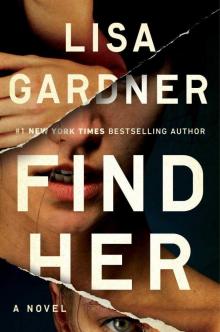 Find Her
Find Her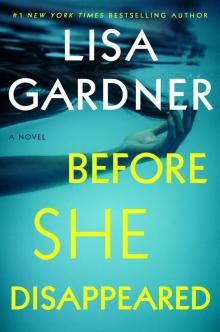 Before She Disappeared
Before She Disappeared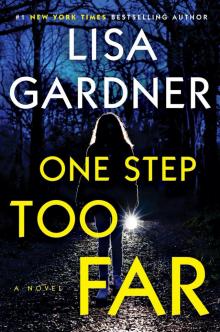 One Step Too Far
One Step Too Far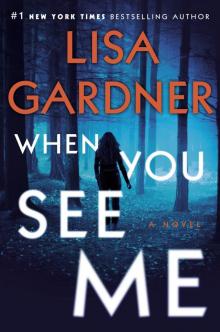 When You See Me
When You See Me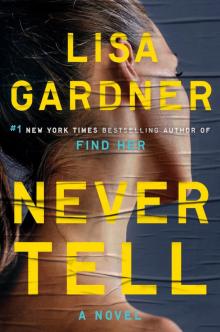 Never Tell
Never Tell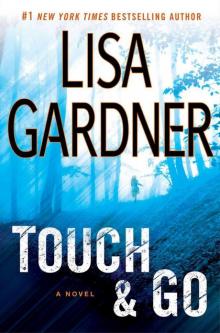 Touch & Go
Touch & Go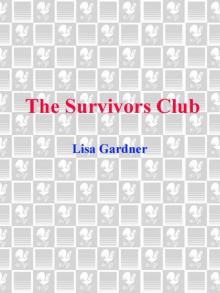 The Survivors Club
The Survivors Club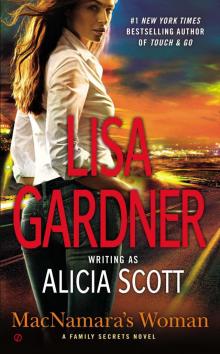 MacNamara's Woman
MacNamara's Woman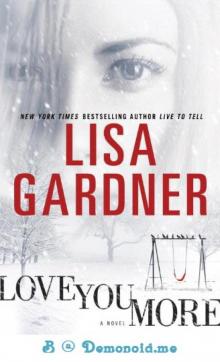 Love You More: A Novel
Love You More: A Novel Gone
Gone The Perfect Husband
The Perfect Husband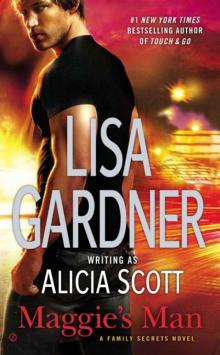 Maggie's Man: A Family Secrets
Maggie's Man: A Family Secrets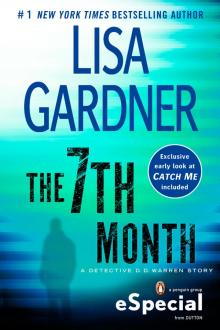 The 7th Month
The 7th Month The Neighbor
The Neighbor Hide
Hide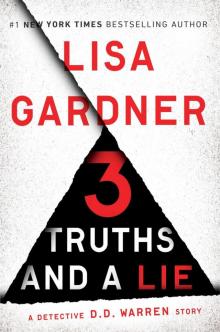 3 Truths and a Lie
3 Truths and a Lie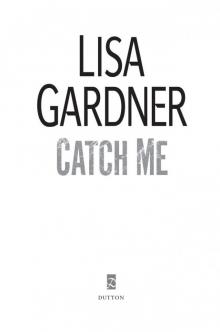 Catch Me
Catch Me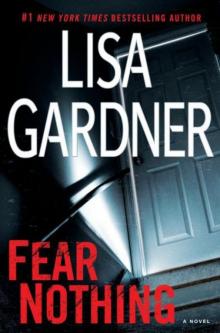 Fear Nothing: A Detective
Fear Nothing: A Detective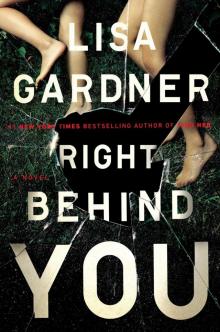 Right Behind You
Right Behind You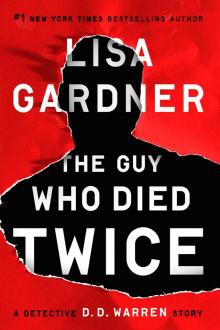 The Guy Who Died Twice
The Guy Who Died Twice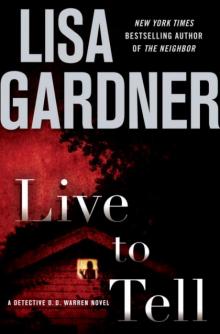 Live to Tell: A Detective D.D. Warren Novel
Live to Tell: A Detective D.D. Warren Novel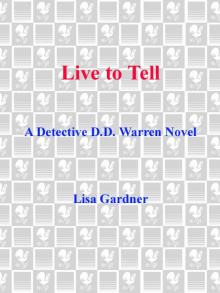 Live to Tell
Live to Tell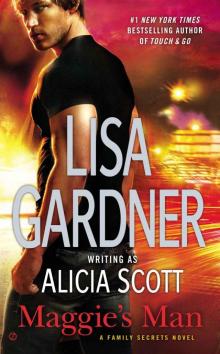 Maggie's Man: A Family Secrets Novel
Maggie's Man: A Family Secrets Novel The Other Daughter
The Other Daughter Alone
Alone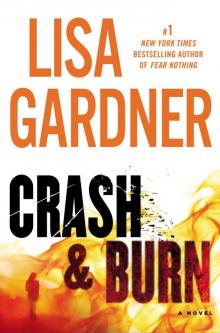 Crash & Burn
Crash & Burn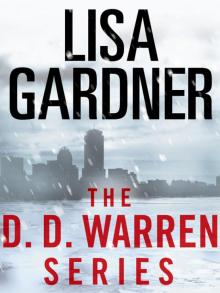 The Detective D. D. Warren Series 5-Book Bundle
The Detective D. D. Warren Series 5-Book Bundle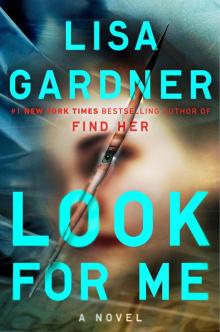 Look for Me
Look for Me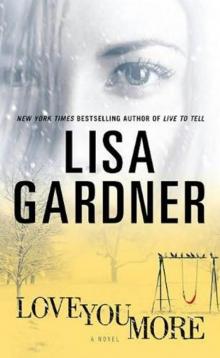 Love You More
Love You More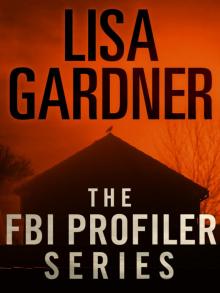 The FBI Profiler Series 6-Book Bundle
The FBI Profiler Series 6-Book Bundle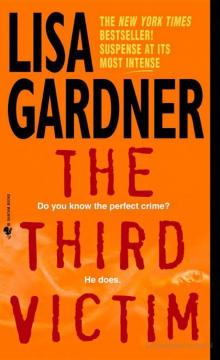 The Third Victim (Quincy / Rainie)
The Third Victim (Quincy / Rainie) Say Goodbye
Say Goodbye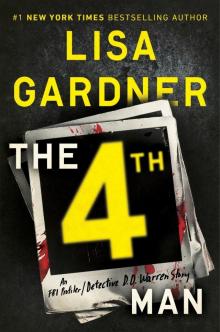 The 4th Man
The 4th Man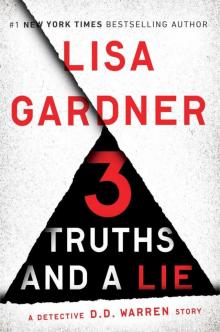 3 Truths and a Lie: A Detective D. D. Warren Story (Kindle Single)
3 Truths and a Lie: A Detective D. D. Warren Story (Kindle Single)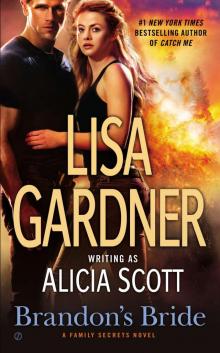 Brandon's Bride
Brandon's Bride